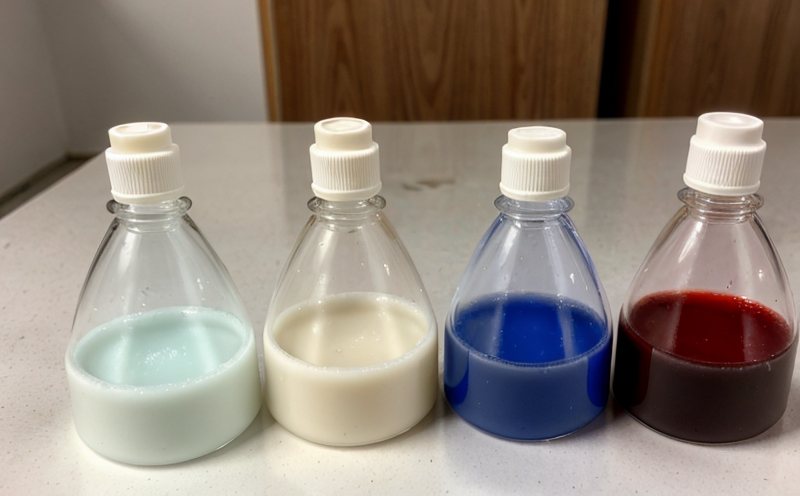EN 13130 Monomer and Oligomer Testing in Food Contact Plastics
The European standard EN 13130:2007 addresses the safety assessment of monomers and oligomers used in food contact plastics. This testing is critical for ensuring that materials do not leach harmful substances into food products, thus safeguarding consumer health. Compliance with this standard is essential for manufacturers involved in the production of containers, packaging, and other articles intended to come into direct or indirect contact with food.
Monomers and oligomers are fundamental building blocks used in polymer synthesis. In plastic production, these compounds may migrate from the material into food due to factors such as temperature variations, chemical interactions, or prolonged exposure. Ensuring that they do not pose a risk is paramount for regulatory compliance and public safety.
The testing method outlined in EN 13130 involves multiple steps designed to assess the potential migration of monomers and oligomers from plastic materials into food simulants. Common test specimens include polyethylene, polystyrene, and polyvinyl chloride (PVC). The standard specifies the use of specific solvents that mimic real-world conditions under which the material might be exposed.
The process typically involves submerging samples in a solvent for a prescribed period before analyzing the extract using high-performance liquid chromatography (HPLC) or gas chromatography-mass spectrometry (GC-MS). The extracted compounds are then compared against a predefined list of potentially harmful substances to determine compliance with the standard.
For quality assurance, laboratories must adhere strictly to this methodology. This includes proper sample preparation, accurate measurement techniques, and rigorous validation procedures. Failure to follow these protocols can lead to incorrect results that may mislead regulatory bodies or compromise product safety.
Compliance with EN 13130 not only ensures legal adherence but also enhances brand reputation by demonstrating a commitment to consumer protection. Additionally, it supports the continuous improvement of manufacturing processes and raw material selection through rigorous testing protocols.
- Quality Assurance: Ensures that all products meet stringent safety standards set forth by European regulatory bodies.
- Innovation: Encourages the development of safer and more sustainable materials for food contact applications.
The importance of this testing cannot be overstated. It plays a crucial role in protecting public health, fostering trust between manufacturers and consumers, and ensuring that products comply with international safety regulations.
Why It Matters
Compliance with EN 13130 is vital for several reasons:
- Legal Compliance: Regulatory bodies across Europe enforce strict standards to prevent harmful substances from migrating into food products. Failure to comply can result in product recalls, legal penalties, and damage to brand reputation.
- Consumer Trust: Consumers increasingly demand transparency regarding the safety of materials used in food packaging. Meeting these expectations builds trust and loyalty among customers.
- Health and Safety: The migration of monomers and oligomers can have serious health implications, particularly for children and vulnerable populations. Ensuring safety is a moral obligation as well as a legal requirement.
The potential risks associated with non-compliance are significant. For instance, certain monomers like phthalates and bisphenol A (BPA) have been linked to hormonal disruptions and other health issues. By adhering to EN 13130, manufacturers can mitigate these risks and contribute positively to public health.
Beyond the legal and ethical dimensions, there are also practical considerations. Meeting such standards enhances a company's reputation in the marketplace, opens up new market opportunities, and fosters long-term relationships with suppliers and customers.
Quality and Reliability Assurance
Ensuring reliable and repeatable test results is paramount when conducting EN 13130 monomer and oligomer testing. This involves several key steps:
- Sample Preparation: Samples must be prepared according to the specified protocols, ensuring consistency across tests. This includes precise cutting of specimens into standard sizes and weights.
- Solvent Selection: The choice of solvent is critical as it mimics real-world conditions. Common solvents include ethanol or acetone, chosen based on the type of plastic being tested.
- Extraction Time: The duration for which samples are exposed to the solvent must be strictly adhered to ensure accurate results.
- Analytical Techniques: High-performance liquid chromatography (HPLC) and gas chromatography-mass spectrometry (GC-MS) are the preferred methods for detecting trace amounts of monomers and oligomers. These techniques provide high sensitivity and specificity, crucial for compliance testing.
The laboratory must also maintain strict quality control measures to ensure that all tests meet international standards. This includes regular calibration of instruments, validation of test methods, and training of personnel on the latest procedures.
By adhering to these stringent protocols, laboratories can provide clients with reliable data that they can trust, thereby enhancing their reputation in the industry.
Customer Impact and Satisfaction
The impact of EN 13130 testing extends beyond compliance; it directly influences customer satisfaction and loyalty. Here’s how:
- Informed Decision-Making: Consumers are increasingly aware of the risks associated with non-food-safe packaging materials. By ensuring compliance, manufacturers can provide customers with transparent information about product safety.
- Increased Trust: Meeting these standards demonstrates a commitment to quality and consumer protection, which builds trust between companies and their customers.
- Positive Brand Image: Companies that adhere to international standards like EN 13130 are viewed more favorably by the public. This can lead to increased brand loyalty and a competitive advantage in the marketplace.
- Market Expansion: Compliance with this standard opens up opportunities for exporting products to European markets, thereby expanding market reach.
In summary, adhering to EN 13130 not only ensures legal compliance but also enhances a company's reputation and customer satisfaction. This holistic approach supports long-term success in the food contact plastics industry.





